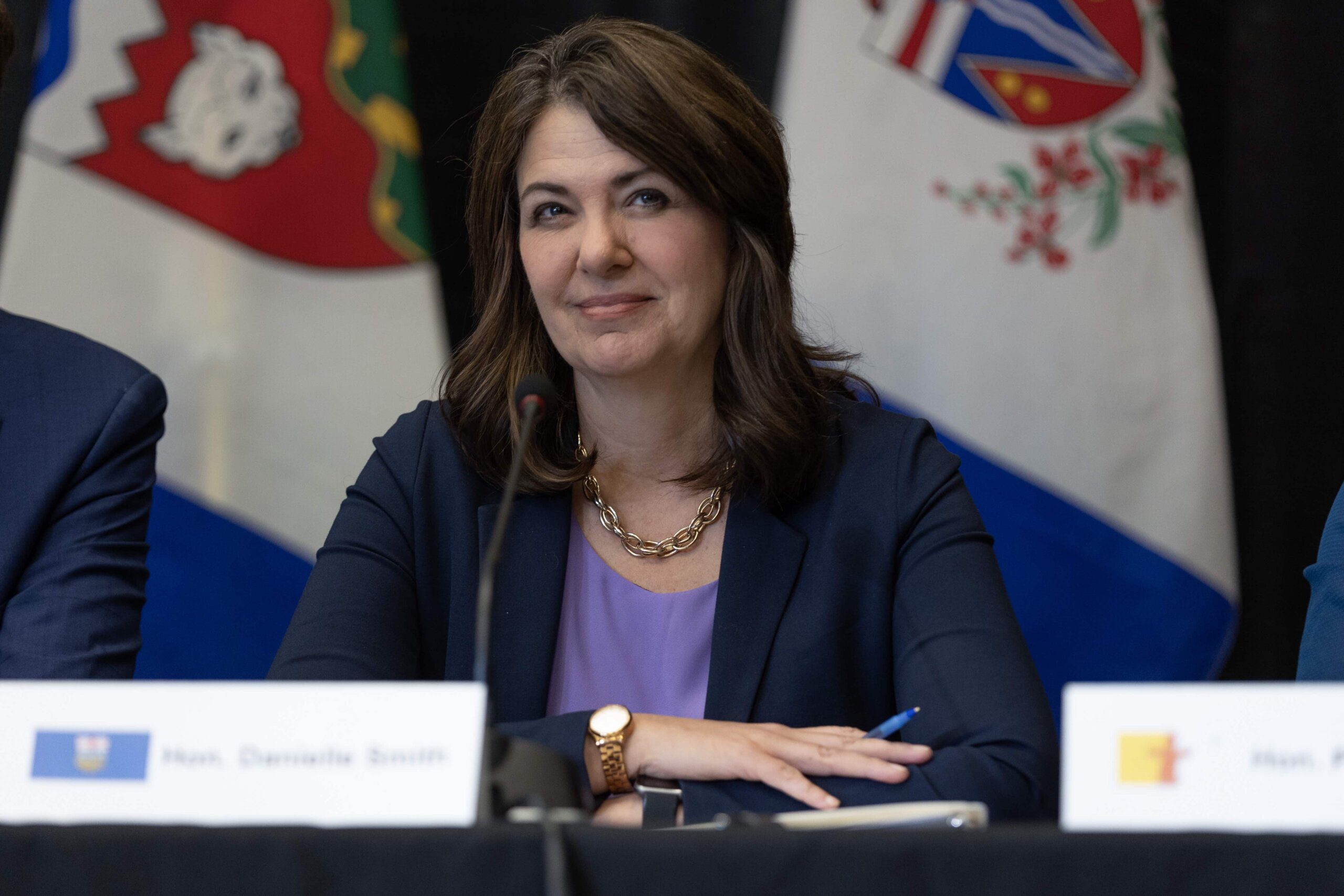Alberta premier Danielle Smith released a six-minute video last week to outline what her government’s legislation on trans issues in the province will look like later this fall, and it’s pretty much as expected given what she teased earlier in February, but with a few more direct appeals to trans youth directly in an attempt to tell them that this is all for their own protection. Smith has been trying to appease the swivel-eyed loons who have captured her party’s membership and who will be voting in a leadership review in early November, and she seems to very much hope that she doesn’t wind up like her predecessor, Jason Kenney, in being ousted by these same hardliners. To that end, that means living up to her promise to take on this moral panic, which falsely claims that schools are secretly encouraging gender transition in children, and that medical transitions take place that will “sterilize them.”
In the video, Smith adopts a nurturing tone to talk about the “sensitive and deeply personal topic” of children who “identify as transgender and who are struggling with gender dysphoria,” which is an interesting delineation. Smith claims that there were “extensive” consultations with parents, educators, healthcare professionals, sporting organizations and members of the trans community—and yet nobody has come forward to say that they engaged in these consultations.
As proposed, doctors will be prohibited from performing any gender-affirming surgeries for anyone under 18 in Alberta, which pretty much doesn’t happen at all as it is. Puberty blockers and hormones for the purposes of gender reassignment are to be prohibited for minors under 16 (except for those for whom treatment has already started)—meaning that puberty will already have mostly occurred, which defeats the purpose of puberty blockers in the first place, and will very likely cause irreparable distress and harm to trans youth—and any 16- or 17-year-olds who want to undergo treatment need parental, doctor and psychologists’ approval, which is no longer considered best practice.
In addition, the bill would require parental consent for any name or pronoun changes at school, with Smith claiming that she wouldn’t want to out any of these youths, and that 16- and 17-year-olds can change it without parental consent but still require notification. Smith also insists that it would only be an “extremely rare” circumstance where such notification would put the youth at risk, and that Alberta Education will provide a “protocol” for the protection of the child throughout the parental-notification process.
The “extremely rare” part has me questioning where she gets that notion from, given that a high percentage of homeless youth—as high as 40 percent in certain cities—identify as queer or trans. That can’t mean that it’s as “extremely rare” as Smith claims, as much as she wants to insist that there couldn’t possibly be any parents out there who don’t love and support their children no matter what. After all, she needs to maintain the fiction that this engages “parental rights.”
The bill also will require parental notification and opt-in for any in-school subject matter involving gender identity, sexual orientation or human sexuality, which goes further than Saskatchewan’s policy but is also grounded in the same fear that learning that queer and trans people exist will somehow indoctrinate children. It’s also not a good sign considering declining condom use and safer-sex education in youth nationally, and for Alberta with its spiking rates of syphilis in particular. The need for any presentations or materials shown to students needing verification for “age-appropriateness” by the department strikes one as being overly cautious, meaning youth aren’t going to get taught about things that they have already learned online.
Smith also pledged to legislate to keep trans women and girls out of competitive women’s and girls’ sports, including in schools and post-secondary institutions, which is also the first time that adults are being affected by these policies aimed ostensibly at child protection. While the legislation wouldn’t extend to recreational or co-ed divisions, she promises to create more of said divisions, which I would not count on. I am curious, however, about what kind of government genital inspectors she plans to hire to enforce these new prohibitions, or if she plans to let this be enforced by would-be vigilantes.
More than anything, what struck me about the video was Smith’s tone, trying to be rational and soothing, rather than the kinds of histrionics that we have become used to when queer or trans rights are up for discussion, and the usual cries of “They’re coming for your children!” She appealed for the forthcoming debate on this legislation to be done with “maturity and compassion,” and not to question the motives of her or her government in introducing it, with a further plea to “depoliticize the discussion,” which is absolutely galling.
“Anyone who claims that these rules were designed to target or somehow harm you in any way are mistaken,” Smith cooed as she addressed the youth in question. “Although questioning or disagreeing with these new policies is any person’s democratic right, adults who choose to tell children and youth that these policies were designed to hurt them or marginalize them, that kind of rhetoric is irresponsible and harmful to the young people involved, and it is entirely false.”
And this is the point where I felt like I was taking crazy pills. Of course her motives need to be questioned, because this kind of legislation is not only unnecessary but it is the result of LGBTQ2S+ scapegoating, which is a deliberate play out of the authoritarian playbook. There is no secret plot to impose “radical gender ideology” on students. You also can’t pretend that legislation that affects the fundamental nature of trans and gender-diverse youth isn’t inherently political.
But this is where Smith’s opponents will also need to be cautious, because the tone she’s adopted in this video is a clue about the tactics she plans to employ, which is to make herself look like she has the rational high ground and will conduct the debate with “emotional maturity,” so that the passionate defence of these trans and gender-diverse youth and their rights is going to come off as looking unhinged. We see this federally, where Pierre Poilievre has very deliberately adopted a calm demeanour in the House of Commons, so that the moment Justin Trudeau so much as raises his voice, Poilievre accuses him of “ranting and raving.” It’s also why the conservatives nationally (and in some places internationally) have adopted the “common sense” framing—because it’s a term that has been weaponized by the right to claim the rational high ground, and come across that if something is “common sense” then it is a self-evident truth and cannot be debated.
Smith is adopting that very same tactic here. This is going to make it very dangerous for opponents of this bill because she will turn their energetic defence against them. It’s going to mean sticking to logic, facts and very targeted emotional appeals, but above all, opponents of the policy need to steer away from the kinds of declarations that these issues shouldn’t be up for debate, even if that’s obvious, because Smith wants to use that as ammunition. We aren’t playing by the rules that most activists have grown accustomed to, and that makes these upcoming months in this fight even more fraught than most of us realize.


 Why you can trust Xtra
Why you can trust Xtra


